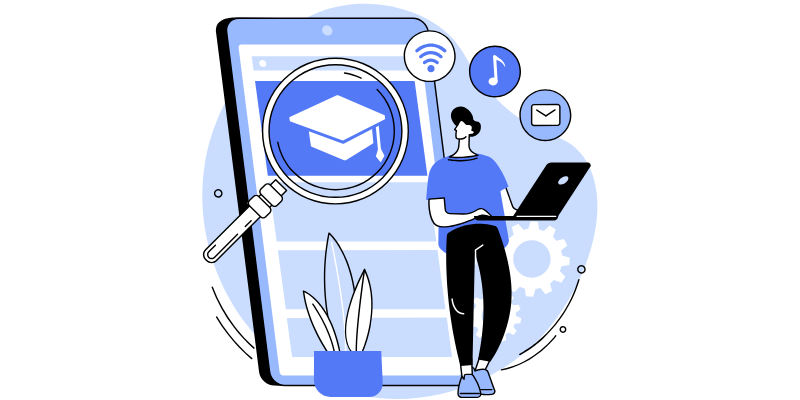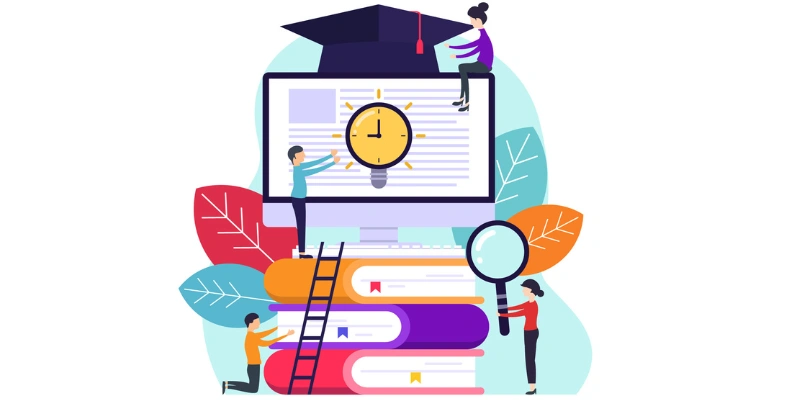
Artificial Intelligence (AI) is revolutionising various aspects of our lives, with education poised for significant transformation. AI’s potential in education extends beyond familiar applications like voice assistants, promising personalised learning experiences akin to having individual tutors for each student. AI will shape the future of education systems globally, including in South Africa. As we explore AI’s role in education, we will examine its advantages, challenges, and ethical implications. This investigation not only reveals exciting possibilities but also guides us towards innovative solutions and balanced implementation. We’ll discover how AI can become an intelligent ally in learning environments, fostering an inclusive and global educational experience that adapts to individual needs in real-time.
Learn How AI Will Shape the Future of Education & Its Growing Role

Artificial Intelligence (AI) is rapidly evolving, enabling machines to learn and make decisions. It’s already assisting in diverse fields, from enhancing healthcare to pioneering self-driving cars. In education, AI is set to revolutionise how students learn and how teachers teach, especially in regions like South Africa.
AI systems are capable of personalising learning experiences by tailoring educational content to individual students’ needs. This personalisation is crucial in environments where students frequently require more individualised attention than teachers can provide. Moreover, AI also streamlines tasks like grading, thus offering teachers more time to focus on critical educational interactions.
Personalised Learning Experiences
Imagine a different classroom experience where lessons are crafted specifically for you, emphasising areas you need help with and celebrating your strengths. AI facilitates this by adapting educational content and pacing lessons per each student’s unique learning disparities.
Adaptive learning technology, now gaining traction in South African classrooms, exemplifies this trend. Programs such as Khan Academy utilise algorithms that adjust task difficulty based on ongoing student performance. These tools ensure learning is engaging and effectively paced, not unlike how a video game adjusts its challenges to match player proficiency.
Connecting AI to Daily Life
The reach of AI into education isn’t a distant fantasy—it is unfolding presently. Every hour spent engaging with modern digital tools like computers and smartphones showcases its potential. With our increasing reliance on technology for entertainment and learning, understanding AI’s intricacies can reshape our learning methodologies radically.
The prospect of AI energising education is immensely exciting. With it, learning becomes personalised and accessible, ensuring equitable educational opportunities. Embracing AI in education today holds the potential to pave the way for an inclusive system, benefiting all learners and educators.
Efficiency in Grading and Administrative Tasks
Picture an assistant that handles all tedious chores—like grading papers and organising attendance—freeing teachers to dedicate more time towards engaging lessons and personalised attention. AI makes this possible. Tools that rapidly grade assignments or assess student comprehension allow educators to focus on crucial in-person interactions.
AI isn’t here to replace educators but assist them in all non-teaching tasks. The promise of improved productivity through AI means teachers can enhance meaningful educational experiences, ensuring every student thrives academically.
Access to Educational Resources and Bridging Gaps
AI has the unprecedented ability to make educational resources available more widely, addressing socio-economic gaps. In regions where traditional educational resources are scarce, AI can equalise access by delivering learning materials online.
AI tools can offer digital books and lessons, even to remote areas, ensuring students in under-resourced regions benefit from education equal to metropolitan peers. Programs like Khan Academy harness AI to democratise education on a global scale and ensure equitable access for all.
Challenges and Ethical Considerations
As promising as AI is, its expansion in schools brings critical challenges that must be addressed. Privacy is a primary concern; AI systems collate sensitive student data, necessitating robust measures to ensure information protection. This consideration echoes the caution we exercise over personal data on social media platforms but extends to educational contexts.
AI must also address biases inherent in its systems. Without careful design, AI could perpetuate or exacerbate inequality in educational treatment. Similarly, equitable access to technology remains an essential challenge, as AI’s benefits presuppose that all students possess the necessary digital tools. Yet, many regions globally, including parts of South Africa, struggle with basic access to such resources.
Transforming South Africa’s Education System with AI

AI holds transformative potential for South Africa’s education system, addressing its many unique challenges. Through strategic implementation, AI can contribute to an education sector with personalised learning paths, resource availability, and teacher support. Achieving this vision can redefine educational accessibility and effectiveness throughout South Africa, offering every student the opportunity to thrive. Initiatives aiming to enhance resource distribution and improve teacher-student interactions will play pivotal roles in AI’s integration within South African classrooms.
As South Africa navigates AI’s educational integration, the promise for inclusive and effective learning becomes increasingly attainable. The thoughtful combination of AI tools can result in an educational environment fostering every student’s potential.
In conclusion, AI’s incorporation into education stands as a promising frontier with vast potential yet to be fully realised. With careful planning and ethical considerations, AI can revolutionise the educational landscape, cultivating a system supportive of every learner. As we chart this new course, technology becomes an ally in our educational journeys, promising a more equitable future for learners worldwide. By leveraging the full breadth of AI’s capabilities, education becomes innovative, personalised, and utterly transformative.
Lesna Naidoo is an energetic office manager at Custom Group.tech. She is passionate about content creation and regularly shares insights through weekly blogs. Her focus is on helping businesses enhance efficiency and build lasting customer relationships.